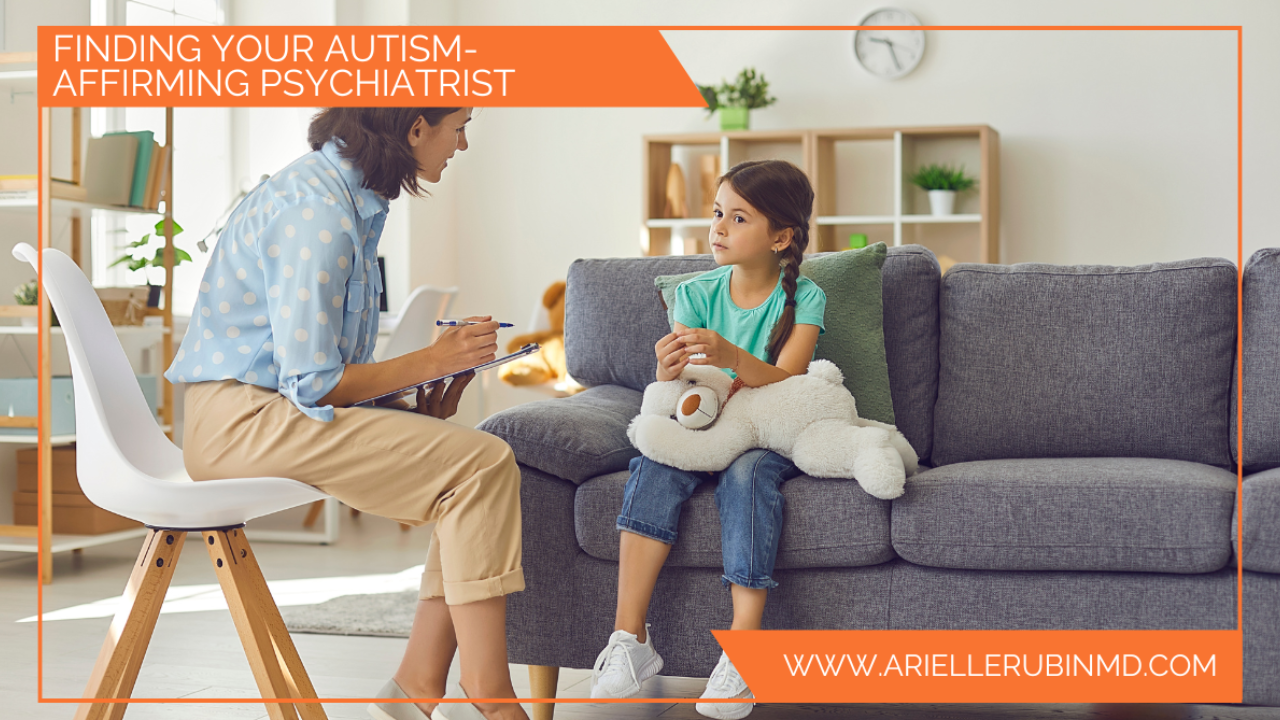Finding Your Autism-Affirming Psychiatrist: A Compassionate Guide to Building the Right Partnership
Mar 24, 2025
In my years of supporting the autistic community, I've sat with countless individuals sharing their journeys to find truly understanding psychiatric care. Like Alex, who described years of appointments where clinicians focused solely on eye contact rather than her debilitating anxiety. Or Sarah, whose previous psychiatrist dismissed her food sensory sensitivities as "just being picky" and shamed her parents for her limited diet. These stories echo a common thread: the profound impact of finding care that truly sees, understands, and celebrates autistic minds.
The Heart of Autism-Affirming Mental Health Care
It's not just about managing anxiety or depression – though these are crucial concerns. It's about finding someone who deeply understands how autism shapes every aspect of mental health, from how anxiety might manifest in increased stimming to how depression could affect engagement with special interests. Through years of clinical practice and deep connections with the autistic community, I've learned that finding the right psychiatric partnership requires careful consideration.
Navigating the Complex Landscape of Autism Care
The journey to finding appropriate care can feel overwhelming. While there are many dedicated, qualified professionals, we also encounter practitioners who may lack proper training or promote approaches not supported by current research. Some may claim "autism expertise" without the depth of understanding needed to provide affirming care while also following evidence-based medicine. Finding the right match means identifying clinicians who combine solid medical expertise with a genuine sense of autistic experiences.
What Makes a True Autism-Affirming Partnership?
The foundation of effective psychiatric care for autistic individuals goes beyond clinical expertise – it's about creating a safe, understanding, and accommodating therapeutic relationship. Here's what genuine autism-affirming care looks like in practice:
1. Trust and Authentic Connection
- Values lived experience as an autistic person
- Demonstrates genuine interest in understanding your unique communication style
- Views autism through a neurodiversity lens, not as something to "fix"
- Uses your strengths and special interests as tools for growth
- Celebrates progress on your terms, understanding that small steps can be significant victories
2. Comprehensive Medical Understanding
- Recognizes how autism intersects with other mental health conditions
- Understands sensory processing differences and their impact
- Considers how medications might affect autistic individuals differently
- Coordinates effectively with other providers in your support network
- Regularly monitors for potential medical issues that can affect autistic individuals
3. Thoughtful Medication Approach
- Explains medications in clear, concrete terms
- Respects that autistic individuals may have different medication responses
- Takes sensory sensitivities into account when choosing medication forms
- Actively monitors for and addresses side effects
4. True Shared Decision Making
- Offers real choices, not predetermined solutions
- Provides information in formats that work for you (written, visual, etc.)
- Values your insights about your own experience
- Welcomes alternative perspectives and problem-solving approaches
Finding Your Match: Practical Steps Forward
Initial Steps
- Research psychiatrists who specifically mention autism experience
- Verify their credentials and training in autism care
- Look for evidence of neurodiversity-affirming approaches
Key Questions for First Appointments
- "How do you view autism in your practice?"
- "What is your experience with autism in adults/children?"
- "How do you approach medication decisions with autistic patients?"
Watch for These Red Flags
- Dismissive attitudes toward autism-specific concerns
- Rigid communication styles that don't adapt to your needs
- Focus on "fixing" autism rather than supporting growth
- Lack of understanding of sensory needs
- Promises of "cures" or quick fixes
The Journey of Building Trust Together
Building a strong therapeutic partnership is like tending a garden – it requires patience, dedication, and mutual investment from you and your psychiatrist. Even in the most compatible relationships, there will likely be miscommunication or times when expectations don't align. These bumps along the way – a session that feels off, a treatment adjustment that takes time to get right, or moments when you need to clarify your needs – aren't signs of failure. Instead, they're opportunities for deepening understanding and strengthening trust.
What matters most is having a psychiatrist who remains committed to learning from these experiences alongside you, views challenges as chances to grow together, and consistently demonstrates that your well-being and autonomy are central to their care.
You're Not Alone: Join Our Autism Roadmaps Community
The journey to finding the right psychiatric care can feel isolating, but you don't have to navigate it alone. As a child psychiatrist specializing in autism care, I've witnessed the transformative power of community support and shared understanding. That's why I created Autism Roadmaps – a space where autistic individuals and their families can find guidance, connection, and hope.
Our Community Offers:
- Monthly live Q&A sessions where we tackle your most pressing questions about autism and mental health
- A supportive network of families sharing similar journeys
- Evidence-based resources curated by autism-affirming professionals
- Regular updates on emerging research and best practices in autism care
I invite you to join our growing community at Autism Roadmaps! Together, we're building a future where every autistic individual has access to the understanding, affirming care they deserve.
Get my Patient-Psychiatrist Partnership Assessment!
Get notified when new blogs are posted and get exclusive insights by joining my weekly newsletter!

